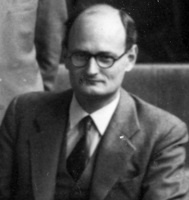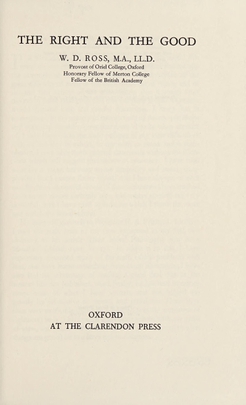
In ethical philosophy, consequentialism is a class of normative, teleological ethical theories that holds that the consequences of one's conduct are the ultimate basis for judgement about the rightness or wrongness of that conduct. Thus, from a consequentialist standpoint, a morally right act is one that will produce a good outcome. Consequentialism, along with eudaimonism, falls under the broader category of teleological ethics, a group of views which claim that the moral value of any act consists in its tendency to produce things of intrinsic value. Consequentialists hold in general that an act is right if and only if the act will produce, will probably produce, or is intended to produce, a greater balance of good over evil than any available alternative. Different consequentialist theories differ in how they define moral goods, with chief candidates including pleasure, the absence of pain, the satisfaction of one's preferences, and broader notions of the "general good".
In ethical philosophy, ethical egoism is the normative position that moral agents ought to act in their own self-interest. It differs from psychological egoism, which claims that people can only act in their self-interest. Ethical egoism also differs from rational egoism, which holds that it is rational to act in one's self-interest. Ethical egoism holds, therefore, that actions whose consequences will benefit the doer are ethical.

Ethics or moral philosophy is a branch of philosophy that "involves systematizing, defending, and recommending concepts of right and wrong behavior". The field of ethics, along with aesthetics, concerns matters of value; these fields comprise the branch of philosophy called axiology.
Hedonism refers to a family of theories, all of which have in common that pleasure plays a central role in them. Psychological or motivational hedonism claims that human behavior is determined by desires to increase pleasure and to decrease pain. Normative or ethical hedonism, on the other hand, is not about how humans actually act but how humans should act: people should pursue pleasure and avoid pain. Axiological hedonism, which is sometimes treated as a part of ethical hedonism, is the thesis that only pleasure has intrinsic value. Applied to well-being or what is good for someone, it is the thesis that pleasure and suffering are the only components of well-being. These technical definitions of hedonism within philosophy, which are usually seen as respectable schools of thought, have to be distinguished from how the term is used in "everyday language". In that sense, it has a negative connotation, linked to the egoistic pursuit of short-term gratification by indulging in sensory pleasures without regard for the consequences.
Normative ethics is the study of ethical behaviour and is the branch of philosophical ethics that investigates questions regarding how one ought to act, in a moral sense.
In ethical philosophy, utilitarianism is a family of normative ethical theories that prescribe actions that maximize happiness and well-being for all affected individuals.

Derek Antony Parfit was a British philosopher who specialised in personal identity, rationality, and ethics. He is widely considered one of the most important and influential moral philosophers of the late 20th and early 21st centuries.

Thomas Nagel is an American philosopher. He is the University Professor of Philosophy and Law Emeritus at New York University, where he taught from 1980 to 2016. His main areas of philosophical interest are legal philosophy, political philosophy, and ethics.

Richard Mervyn Hare, usually cited as R. M. Hare, was a British moral philosopher who held the post of White's Professor of Moral Philosophy at the University of Oxford from 1966 until 1983. He subsequently taught for a number of years at the University of Florida. His meta-ethical theories were influential during the second half of the twentieth century.
In moral philosophy, deontological ethics or deontology is the normative ethical theory that the morality of an action should be based on whether that action itself is right or wrong under a series of rules and principles, rather than based on the consequences of the action. It is sometimes described as duty-, obligation-, or rule-based ethics. Deontological ethics is commonly contrasted to consequentialism, utilitarianism, virtue ethics, and pragmatic ethics. In this terminology, action is more important than the consequences.
"Famine, Affluence, and Morality" is an essay written by Peter Singer in 1971 and published in Philosophy & Public Affairs in 1972. It argues that affluent persons are morally obligated to donate far more resources to humanitarian causes than is considered normal in Western cultures. The essay was inspired by the starvation of Bangladesh Liberation War refugees, and uses their situation as an example, although Singer's argument is general in scope and not limited to the example of Bangladesh. The essay is anthologized widely as an example of Western ethical thinking.

Sir Bernard Arthur Owen Williams, FBA was an English moral philosopher. His publications include Problems of the Self (1973), Ethics and the Limits of Philosophy (1985), Shame and Necessity (1993), and Truth and Truthfulness (2002). He was knighted in 1999.
Rule utilitarianism is a form of utilitarianism that says an action is right as it conforms to a rule that leads to the greatest good, or that "the rightness or wrongness of a particular action is a function of the correctness of the rule of which it is an instance". Philosophers Richard Brandt and Brad Hooker are major proponents of such an approach.
Two-level utilitarianism is a utilitarian theory of ethics developed by R. M. Hare. According to the theory, a person's moral decisions should be based on a set of moral rules, except in certain rare situations where it is more appropriate to engage in a 'critical' level of moral reasoning.

The Case for Animal Rights is a 1983 book by the American philosopher Tom Regan, in which the author argues that at least some kinds of non-human animals have moral rights because they are the "subjects-of-a-life," and that these rights adhere to them whether or not they are recognized. The work is considered an important text within animal rights theory.
Brad Hooker is a British-American philosopher who specialises in moral philosophy. He is a professor at the University of Reading and is best known for his work defending rule consequentialism.
Negative consequentialism is a version of consequentialism, which is "one of the major theories of normative ethics." Like other versions of consequentialism, negative consequentialism holds that moral right and wrong depend only on the value of outcomes. That is, for negative and other versions of consequentialism, questions such as "what should I do?" and "what kind of person should I be?" are answered only based on consequences. Negative consequentialism differs from other versions of consequentialism by giving greater weight in moral deliberations to what is bad than what is good. Due to this, it can be considered an instance of what has been called "suffering-focused ethics", the view that the reduction of suffering has moral priority over any other possible duties we may think of.
The general concept or principle of moral universalizability is that moral principles, maxims, norms, facts, predicates, rules, etc., are universally true; that is, if they are true as applied to some particular case then they are true of all other cases of this sort. Some philosophers, like Immanuel Kant, Richard Hare, and Alan Gewirth, have argued that moral universalizability is the foundation of all moral facts. Others have argued that moral universalizability is a necessary, but not a sufficient, test of morality. A few philosophers have also argued that morality is not constrained by universalizability at all.
Suffering-focused ethics are those positions in ethics that give moral priority to the reduction of suffering. This means that they give greater weight to the reduction of suffering than to the promotion of pleasure, happiness, or to other things that one might consider valuable. According to some suffering-focused ethics, humans should concentrate exclusively on reducing preventable suffering. Other views can include additional features, such as the prevention of other disvalues or the promotion of other positive values, while giving priority to reducing preventable suffering over them.

The Right and the Good is a 1930 book by the Scottish philosopher David Ross. In it, Ross develops a deontological pluralism based on prima facie duties. Ross defends a realist position about morality and an intuitionist position about moral knowledge. The Right and the Good has been praised as one of the most important works of ethical theory in the twentieth century.







